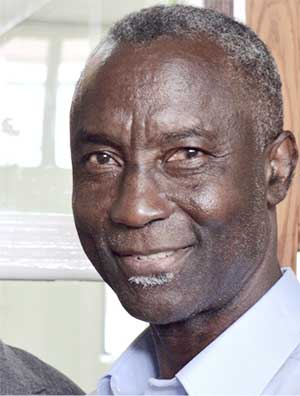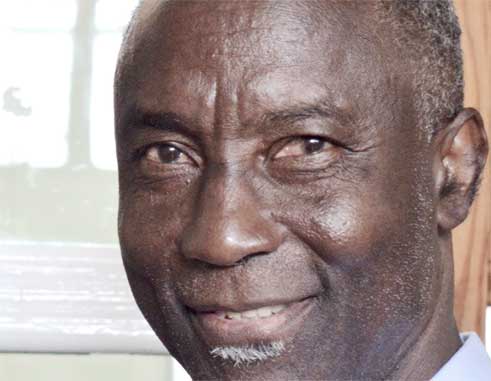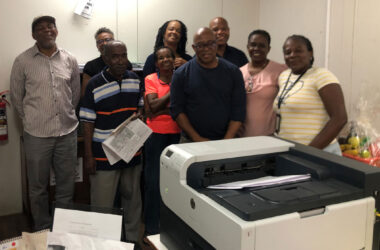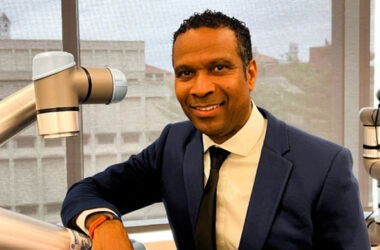Cited for Service In Education And Journalism.
ONE of St. Lucia national awards went this year to Dr. Humphrey A. Regis, the professor who is from Zhon in Dennery but may seem to be from “King Street” in Vieux Fort.
The Saint Lucia Medal of Merit (Gold) went to Dr. Regis for his “long and meritorious service in education and journalism,”

The award recognizes the almost 50 years of contributions as a teacher, and almost 45 years of contributions to the print media and the broadcast media by Dr. Regis, especially in Saint Lucia, even though he has lived in the United States since 1974.
They include contributions in education that a review calls a “one-man revolution,” and contributions in journalism and mass communication that another review calls “scholarly, authoritative, remarkable,” and yet others even call “seminal.”
As he has made these contributions, Dr. Regis has been dedicated and persistent, but he also attributes his ability to make them not to the cooperation of our privileged sectors but to the molding of him by teachers, the inspiration of him by models who have lived over the last few millennia, and the assistance to him from friends and colleagues – in the island, in the region and outside the region.
Dr. Regis began his career in education when in January of 1969 he succeeded the late Brendan Hippolyte as the teacher of the “Scholarship Class” at St. Aloysius R. C. Boys School in Castries. From 1970 to 1972 he studied education at the Saint Lucia Teachers College, where classmate Mr. Ignatius Jean urged him to consider careers in education and in journalism. He says he especially is pleased with the instruction and nurturing of his tutors or “five other mothers” at the College – Ms. Muriel Gill, Ms. Marjorie Thomas, and Ms. Marjorie Brathwaite, and the late Ms. Ruby Yorke and Ms. LuscaTheophilus.
After his studies at Saint Lucia Teachers College, he served for two years as teacher at Vieux Fort Junior Secondary School. He also took an initiative that resulted in him being the first reporter for Radio Saint Lucia in the south, as well as a contributor to THE VOICE He filed with Radio Saint Lucia the first report on the fire that devastated the Winera boxing plant in Vieux Fort more than 40 years ago.
He continued his service in journalism to Saint Lucians and other Caricommoners in the Washington, DC area after he finished the bachelor’s degree in communicative arts at the University of the District of Columbia in 1977. That was while he studied for the master of arts degree he earned in journalism at the University of Maryland at College Park in 1979 and the doctor of philosophy degree that he earned in mass communication at Howard University in 1983.
Since 1995, Dr. Regis has been known for an initiative that he calls “Introduction to the History of the World African Community”. In this project, he has been “teaching” the millennia-old history of the Community to young learners in secondary schools; to older learners in adult education and “enrichment” programmes; and in lectures, print media articles, and broadcast media interviews, to the general community. Two of the interviews were with Primus Hutchinson and with Nkrumah Lucien and came to Saint Lucians through the National Television Network (NTN).
The launching of the project took place at his alma mater, Vieux Fort Comprehensive Secondary School, when he collaborated with three of its former teachers of history – Ms. Lydia Sadoo, Mr. Sylvester Clauzel, and the late Mr. Wayne Louis – to introduce the history to the more than 250 students in its Form 3.
The project was so successful that the teachers secured the authorization from the principal for the incorporation of the study of the history in the curriculum in Form 3. They also asked Dr. Regis to write a textbook they could use in that instruction, and Dr. Regis in response wrote AFRICANS BEFORE CARICOM.
Dr. Regis used his resources and those at University of South Florida to produce the first two editions of the book. He presented copies of that first edition to the School (when he was featured speaker at the graduation ceremony) in 1999, and copies of the second edition to the S. Wayne Louis Foundation in 2003. He also has produced the third edition that is available from AuthorHouse through amazon.com.
From about 1995 to about 2005, at least seven “houses” in Saint Lucia that Dr. Regis asked to publish Africans Before CARICOM locally would not entertain the idea. But one review in The VOICE praised the book and proposed that the combination of the project and the book seemed to represent “a one-man revolution” in the teaching in Saint Lucia of the history of the World African Community.
Dr. Regis also has introduced the history to students in secondary schools in Micoud, Dennery, AnseGer, Piaye, La Fargue, and Soufriere. One of his recollections is that when he has explained why people of African Descent have the hair, noses, lips and complexions they have, many of the students have heaved collective sighs of relief.
With help from Ms. Pauline Antoine Prospere and the late Mr. Hubert King, Dr. Regis has introduced the history to the “learners” in “adult education” and “enrichment” in Saltibus, Mongouge, Vieux Fort, and Blanchard. The introduction in Blanchard lasted about 2.5 hours and was all in Kweyol! To Dr. Regis, it was one of his most gratifying part academic, part professional, and part public service, contributions.
With the help of other contributors to public service, Dr. Regis also has introduced the history to general audiences in Mon Repos and Dennery, and with the help of Mr. ModesteDownes, to general audiences in Castries, Vieux Fort and Desruisseaux. In Dr. Regis, one strong emotion was the gratitude he felt when he presented Africans Before CARICOM to his “Cousin Nah” in Dennery. That was his way of recognizing the contribution made to his education by the man who is her late husband and was one of his favourite primary school teachers, Mr. Robert Velinor of Dennery Boys School.
Another perhaps notable recollection of Dr. Regis is that many of the adult learners and members of the general public have seemed to indicate that the relating of the history seems to give voice to an unspoken knowledge they have had deep inside.
Even though the content the project has been imparting has had this resonance, the project has never received any substantial or continual or empirical or professional attention from the Ministry of Education in Saint Lucia. This is the case, even though many “leaders” and “intellectuals” in the island have been proposing “reparations” that they claim would among other things fund the achievement of the objectives it has been making progress in achieving for more than two decades.
In addition to these contributions, in the area of education, Dr. Regis helped initiate last year a study-abroad experience for students and professors at Texas Southern University interested in education in health and in service in health in Saint Lucia.
Another body of contributions of Dr. Regis includes the results of his more than 30 years of research and related presentations and publications on the relationships between mass communication and such imperatives as cultural definition, cultural continuance, cultural change, cultural domination, orientation to reference groups, and location in global social space – among Saint Lucians and other Caricommoners.
One of the most commended contributions from Dr. Regis to criticism, theory and research is the framework that he developed for the study and the explication of the relationship between mass communication and what he calls cultural domination by re-importation or re-exportation, which challenges and complements the traditional framework he calls mass communication and cultural domination by importation or exportation. Several houses in the Caribbean, including one associated with one of its most honored institutions, refused to publish the manuscript on the subject. But it became the first and only “special monograph edition” of The Journal of African Communications in 2004, and was re-published by The Edwin Mellen Press in 2015.
On the research of Dr. Regis the doctoral student, one great influence was the gentle “giant” and “critic” and “uncle” and “elder brother” and nurturer of students, and the favourite professor of Dr. Regis in the Washington, D.C. area – Dr. NwafoNwankwo. With the measured guidance of Dr. Nwankwo, Dr. Regis conducted research that he reported in his dissertation and that spawned papers in at least seven conferences and articles in at least five journals in such areas as communication, psychology, immigration studies, international studies and Caribbean studies.
On the research of Dr. Regis in later years, three supporters of him were his former supervisors at the University of South Florida. One was Dr. Donna Dickerson, who was the director of the School of Mass Communications when Dr. Regis served as associate professor in the School. The others were Dr. Juel Smith and Dr. Geoffrey Okogbaa, who were directors of the Institute on Black Life / Center for Africa and the Diaspora when Dr. Regis served as faculty associate in the Institute and Center.
The book that presents the highlights of the research Dr. Regis has conducted over more than 30 years has the title Liberated Academics in Studies of Caricommoners and was published jointly by him and Vieux Fort Comprehensive Secondary School in 2013 in celebration of the 50th anniversary of the establishment of the School.
In Liberated Academics in Studies of Caricommoners, in addition to “T’cherVelinor” at Dennery Boys School, Dr. Regis gives thanks to his “other mothers” at Dennery Infant School. They include Ms. Rose Anna Dash, Ms. Cecilia Daniel, Ms. Francillia Jackson, Ms. Marie Lesmond, Ms. Marguerita Vidal, and Ms. Clara Emmanuel. And, they include one of his classmates at Dennery Boys School, Mr. Paul Gaspard.
In the development of the ideas that informed the research, Dr. Regis is grateful for the critical but supportive inputs of one of his friends who also is one of his closest collaborators in things critical and qualitative and quantitative. He is Dr. MinabereIbelema, who is from Nigeria and with whom Dr. Regis has collaborated in several conference presentations, at least three journal articles, at least three monographs, and especially, the book Culture and Mass Communication in the Caribbean that Dr. Regis compiled and that University Press of Florida published in 2001.
One reviewer called Liberated Academics in Studies of Caricommoners a “scholarly, authoritative, remarkable” volume that among other things proposes a Saint Lucian and Caricommoners “creolism” that could serve as a model for a world “globalism.”
All of the proceeds from the sale of Liberated Academics go toward the Cheikh Anta Diop Awards programme which Dr. Regis has established at the School and which received its name from the late Senegalese multidisciplinary and interdisciplinary genius who revolutionized the study of the World African Community.
The Diop awards help students pay for their books and examinations in history in an attempt to make normal our study of our history from our perspectives as our key to our understanding of our selves and our imagining and our realizing of our destinies.
Liberated Academics is available from Vieux Fort Comprehensive Secondary School at La Ressource, for which the primary means of contact are 454 6350 (phone) and [email protected] (e-mail).
In 2004, Dr. Regis made a presentation at a conference that Mr. WislonJnBaptiste organized and that focused on the development of the Saint Lucian ideology. The manuscript for the presentation became an article in Journal of Caribbean Studies. The conclusion of the manuscript captures what Dr. Regis sees as one major need in Saint Lucians in particular and Caricommoners in general. It speaks also to the need that has driven him to make the contributions he has made in the initiative he calls Introduction to the History of the World African Community and in his more than 30 years of research on journalism and mass communication within the lives of Saint Lucians in particular and Caricommoners in general. The conclusion was:
“It may seem noteworthy that we have started the discussion of a Saint Lucian and Caribbean ‘Vital World View’ by taking a look at the African history, psychology, principles, and behavioral tendencies that may inform this discussion. This indeed is necessary in the process of addressing the very real, very ferocious, and very much unabated battle in the psyches of [Saint Lucians and Caricommoners], especially those who partly or wholly are of People African Descent.
“This battle is the result of the location in these psyches of two contrasting places for elements related to the African heritage. On the one hand, at the unconscious level (as the lay person would say, without thinking twice), we tend to express these elements powerfully – for example in speech, in music, and in the tendency toward xenophilia. On the other hand, at the conscious level (or, as the lay person would say, after thinking twice), we tend to marginalize, devalue, dehumanize, and demonize these elements powerfully – for example, by the use of language that speaks of them as ‘ugly’ or ‘bad’ or ‘stupid’ or ‘ignorant,’ and especially by the frequent use of one of the most common expressions in the island and the region: ‘black and ugly.’
“The incorporation of the review of African history, psychology, principles and/or behavior in this exposition represents one part of the promotion of the connection between the education of the people of Saint Lucia and the Caribbean on the African part of their heritage on the one hand and the ‘understanding’ and ‘valuation’ and ‘resolution’ that [Saint Lucians and Caricommoners] develop with regard to things Saint Lucian and things Caribbean on the other.
“Without the education and the resulting understanding, valuation and resolution, the psyches of [Saint Lucians and other Caricommoners] will find no ‘peace.’”














